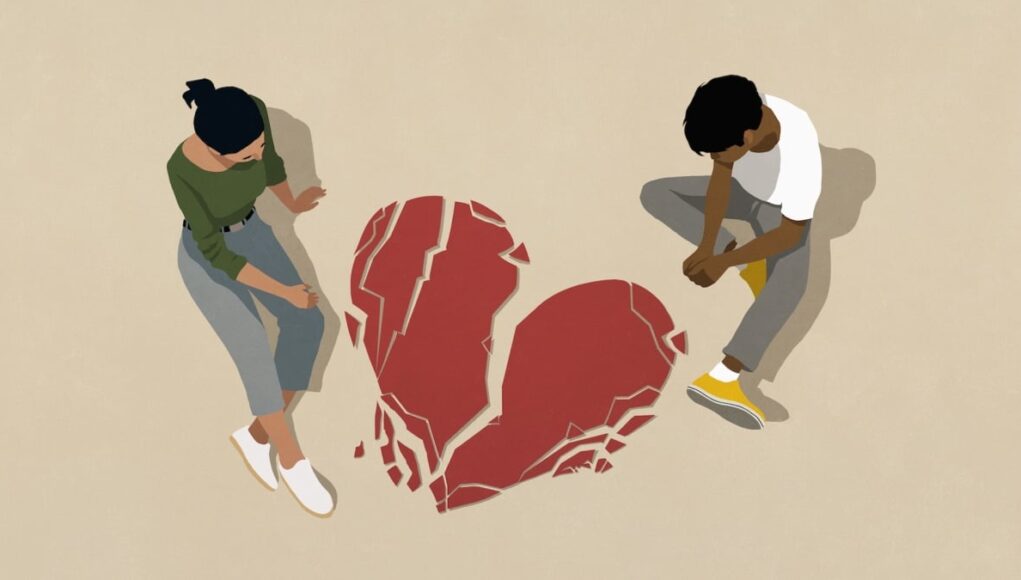Breaking up is horrible. Not only are you dealing with the complicated emotions of parting ways with someone you once loved more than anyone, you’re mourning the future you once pictured together and dealing with the messy logistics of disentangling your lives — both online and off.
When you’re in the thick of heartbreak, it can feel like there’s no exit in sight. I’ve lost track of the number of times I’ve searched “how to get over a breakup” while nursing a broken heart. So, I decided to dig deep and speak to dating experts and therapists to figure out how to move on after the end of a relationship.
The psychology of a breakup
Relationship therapist Alexis Friedlander tells Mashable that an important step in moving forward after a breakup is understanding what’s happening on a psychological and even neurological level. “When you break up with someone, you’re not only letting go of the relationship itself, you’re also grieving the future you imagined with them, and even a part of yourself,” he says. “Psychologists call this Self-Expansion Theory: in relationships, our identities expand into our partners, so separation feels like losing a piece of who we are.”
If you’re on the receiving end of the breakup, you may also be feeling a deep sense of rejection. It’s normal for that to be incredibly painful. From an evolutionary perspective, our brains are hard-wired to process rejection as a threat to our survival because it was once essential for humans to remain in communities. As I write in my book The Love Fix, “fMRI studies have found that when we’re rejected, the same parts of our brain are activated as when we’re in physical pain. So much so, that one study found that paracetamol reduces the emotional pain that rejection causes.” In that study, people were asked to think about painful rejection experiences from the past and those who took Tylenol (a brand name for paracetamol) reported significantly less pain than those taking a placebo.
Breakups can reopen these old wounds, says Friedlander. “If you have a fear of abandonment, for example, the separation can trigger past traumas, making the pain feel even sharper.” However, emotional pain is not a sign that you’re “doing badly” or weak or pathetic. This is just what our brains and bodies do when we’re going through a separation. “The key thing I always tell people is: this pain is normal,” he says. “It’s not weakness (it’s your brain and body responding to the loss of something deeply important).”
Give yourself time to sit in your feelings
Relationship expert and dating coach Courtney Boyer says it’s imperative you give yourself space to feel your feelings — however uncomfortable that may seem. “Give yourself time to mourn the end of a relationship and the loss of someone important to you. I cannot emphasize this step enough,” she says. “You will want to skip it because, frankly, it sucks having to sit in your feelings. This is why it’s so important to have effective coping strategies.”

Credit: Getty Images / Malte Mueller
Leanne Yau, polyamory educator and relationship coach at Poly Philia, tells Mashable, “Breakups are basically dealing with a form of grief and loss. Healing and growth are not linear.”
Putting timeframes and deadlines on your own heartbreak just won’t work. “My top advice above everything else is just to be patient with yourself… it’s going to take the amount of time that it’s going to take,” Yau adds.
Can you be friends with an ex?
In the midst of parting ways, it’s normal to want to hold on to some degree of connection. This person was once closer to you than anyone else, you shared everything with them, they know you on a deep level. So, once the romantic bond between you breaks, what do you do with that level of closeness? Can you really be friends with someone you once loved? When Carrie Bradshaw broke up with Big, she pondered: “If you loved someone and you break up… where does the love go?”
I’ve been guilty of rushing into friendship too soon and, let’s be real, for all the wrong reasons. So, number one: ask yourself why you want to be friends? Is it purely because you value them as a person and don’t want to lose them from your life? Or, are you hoping that by keeping them in your life, they’ll hopefully change their mind and fall miraculously back in love with you again? If it’s the latter, friendship is not a good idea (because it’s not really a platonic relationship you want). You need to put yourself first and protect your own mental wellbeing. Listen to Ariana Grande’s “we can’t be friends” and park the friendship plan for now (or forever).
Zachary Zane, Grindr’s sex and relationship expert, tells Mashable that one of the biggest mistakes people make after a breakup is trying to be friends with your ex — or even just in each other’s lives — too soon. “If you’re going to be friends in the end, then what’s the hurry? Take a year before reaching out and talking. Don’t just take a month or two,” says Zane.
If friendship is important to you (and it’s for the right reasons), know that it will take some work. Yau says: “Staying friends after a breakup is much, much harder than a clean break — it takes effort, intention, and emotional clarity.”
Remember the reasons you broke up
It’s easy to look at your past relationship through rose-tinted glasses. In moments of doubt, you convince yourself that they were your perfect person, that no one will ever compare, that you’ll never love again. But remind yourself of the reasons you broke up with each other. Things weren’t working.
Sex educator Topher Taylor says it’s really important to full accept the reality of why the relationship broke down. “It’s normal to go into romanticisation mode when we split, especially if we are the ‘dumpee’, and look at everything through rose-tinted shades. Some of us invent an entirely different reality or a person who didn’t exist.”
Taylor says one of his previous relationships broke down for many reasons, one of which was an issue with communication style.
Mashable Trend Report
“This led to me genuinely finding him deeply boring and not enjoying my daily life. But I found myself forgiving and rewarding his behaviour, simply because it felt easier to do that than be alone,” says Taylor. “So, in the early days of the split, I kept oddly specific reminders of the reasons the relationship broke down around me. Wrote a message on my phone’s lock screen, put a note on my fridge, and left notes around my home.”
Writing a list of why the relationship broke down could be very useful, particularly when the romanticisation starts to kick in. I’ve also found it helpful to keep a list of icks about exes, to remind myself of the moments I really wasn’t attracted to them.
Stop looking at their social media
In the past, I’ve hesitated before unfollowing exes from social media because I didn’t want to seem mean or dramatic. But honestly, what about my needs? Was it helpful seeing my ex’s stories and feeling like a dagger was going through my heart anytime he posted? Um, definitely not. What about when they move on (sorry, but it will happen one day), and post photos of their new partner?
Taylor says, “No looking them up on Instagram, no burner accounts, no using websites to anonymously view stories. Zero. You need to live like they don’t digitally or physically exist.”
“During one breakup, I banned all of their social media URLs from being viewed on my web browser. Every time you look them up, think of it as the timer resetting.”
So, though it may feel harsh, remind yourself that this is an act of self-preservation. Unfollow their Instagram, block them if you need to. Be disciplined about it. It’ll feel so hard at first, but it will help you immeasurably.
Do you need closure?
The need for closure or even confrontation can hang heavy during a breakup. Do you feel you had an opportunity to speak your truth? Do you have unanswered questions? Do you both have things you need to say before you can draw a line under it once and for all?
Or are you looking for your moment in court? Are you fantasising about saying everything you’ve been bottling up lately — no matter how hurtful or damaging that may be? Listen, we’ve all been there. In these situations, talk to your friends and allies, and crucially, people in your life who give good advice (and don’t just tell you what you want to hear).
In our fantasy arguments with our exes, one thing we neglect to consider is the other person’s response. You might dream of a moment akin to Bridget Jones confronting Daniel Cleaver to the soundtrack of Aretha Franklin’s “R-E-S-P-E-C-T”. But in reality, people clap back, they say mean things when they feel attacked. You could end up leaving that conversation feeling more hurt and angry than before.
Friedlander says that closure is overrated. “A lot of people are misled by this idea that their ex holds some kind of healing power by sharing the right words or conversation. I can tell you, having helped hundreds of people dealing with breakups, these conversations are usually disappointing,” he says. “And this is why it’s important to understand that closure is something you claim yourself. A lack of response is closure; not replying or ghosting is a form of communication.”
Should you go ‘no contact’?
‘No contact’ means ceasing all communication with a person. It can mean cutting off the means to contact you by blocking a person’s number, unfollowing or blocking on social media, and ignoring any messages.
In bad breakups, where anger and resentment are involved, no contact could provide some breathing space. If a person has cheated or hurt you, no contact is absolutely fair. But even if you just need a bit of time to move on, no contact can be the boundary you need to move on. Zane is a big fan of no contact and says “I really think that after a hard breakup, both parties need some time to heal and move past the anger, resentment, or sadness they may feel towards a partner. Only then should you reach out, and that’s if you want to. There’s no shame in not being friends with an ex.”
In serious cases, where a partner has been abusive and you’re concerned about retaliation, no contact is a must. Remove all means they have to contact you and ask your friends and family not to reveal any information about you online (or offline) for your own safety. Report safety concerns to the police and keep a record of any unwanted contact.
Spend time with people you love
Now is the time to lean on your friends and family. Surround yourself with people who love you and are on your side. Make plans, go for brunch, visit a friend you haven’t seen for ages, vent to your besties, book fun activities, send long voice notes and have long phone calls. If you’re really struggling, open up to people, ask for help, company, support. Get out of the house and engage with the world around you. Take joy in doing wholesome activities with pals: go to the cinema, do a wine tasting event, go to a comedy show, go to the seaside for the day. Remind yourself of the love you still have in your life: platonic and familial.

Credit: Getty Images / Malte Mueller
Practise gratitude
Allow yourself to look around and appreciate what you do have. Be grateful, Boyer advises. “Yes, even in the midst of anguish, there are still things to be grateful for. You woke up. The sun. Air in your lungs. Fresh flowers. Hot cup of tea.”
“These don’t have to be profound. They can be mundane. Acknowledging the small things connects us back to who we are on this planet and shows our mind that we can continue to function (and eventually thrive) without that person beside us,” she adds.
As Yau says: “You can experience grief and joy at the same time. They’re not mutually exclusive.”
Don’t rush to move on
If your first instinct is to re-download dating apps and get yourself a new partner right away, take a breath. Yau says: “Jumping into another romantic relationship when you’re not ready to show the level of vulnerability it needs is not advisable or fun for anyone involved.”
Everyone copes with heartbreak differently, and for some people, it’s normal to want to sleep with new people as a means of distraction, escapism, or just for the sheer fun of it. As Yau says: “There’s a saying, ‘The best way to get over someone is to get under someone else.’ And I think there is some truth to having a bit of fun as a distraction — but it depends on the mindset you go in with.”
If you’re throwing yourself into some casual fun, that’s fine, but make sure you’re giving yourself some breathing space to reflect and grieve the relationship. Make sure you’re not using sex as a way to numb the emotional fallout.
Above all: remember you’re enough on your own. Your newfound singleness doesn’t need to be “fixed”. There’s no rush to find a new partner. Now is the time to hunker down, feel your feelings, lean on your loved ones, and remind yourself how truly great you are.






